Related Research Articles

Jonathan Vincent Voight is an American actor. He came to prominence in the late 1960s with his Academy Award–nominated performance as Joe Buck, a would-be gigolo, in Midnight Cowboy (1969). During the 1970s, he became a Hollywood star with his portrayals of a businessman mixed up with murder in Deliverance (1972); a paraplegic Vietnam veteran in Coming Home (1978), for which he won an Academy Award for Best Actor; and a penniless ex–boxing champion in the remake of The Champ (1979).
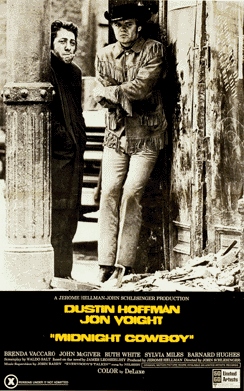
Midnight Cowboy is a 1969 American drama film, based on the 1965 novel of the same name by James Leo Herlihy. The film was written by Waldo Salt, directed by John Schlesinger, and stars Dustin Hoffman and Jon Voight, with notable smaller roles being filled by Sylvia Miles, John McGiver, Brenda Vaccaro, Bob Balaban, Jennifer Salt, and Barnard Hughes. Set in New York City, Midnight Cowboy depicts the unlikely friendship between two hustlers: naïve sex worker Joe Buck (Voight), and ailing con man Enrico "Ratso" Rizzo (Hoffman).

Luchino Visconti di Modrone, Count of Lonate Pozzolo was an Italian filmmaker, stage director, and screenwriter. A major figure of Italian art and culture in the mid-20th century, Visconti was one of the fathers of cinematic neorealism, but later moved towards luxurious, sweeping epics dealing with themes of beauty, decadence, death, and European history, especially the decay of the nobility and the bourgeoisie. He was the recipient of many accolades, including the Palme d'Or and the Golden Lion, and many of his works are regarded as highly-influential to future generations of filmmakers.
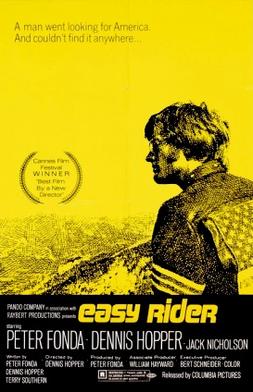
Easy Rider is a 1969 American independent drug culture road drama film written by Peter Fonda, Dennis Hopper, and Terry Southern, produced by Fonda, and directed by Hopper. Fonda and Hopper play two bikers who travel through the American Southwest and South, carrying the proceeds from a cocaine deal. The success of Easy Rider helped spark the New Hollywood era of filmmaking during the early 1970s.
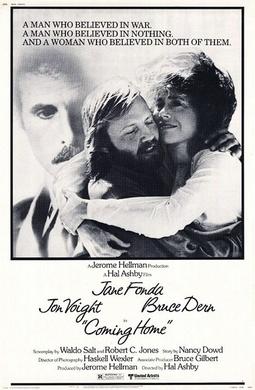
Coming Home is a 1978 American romantic war drama film directed by Hal Ashby from a screenplay written by Waldo Salt and Robert C. Jones with story by Nancy Dowd. It stars Jane Fonda, Jon Voight, Bruce Dern, Penelope Milford, Robert Carradine and Robert Ginty. The film's narrative follows a perplexed woman, her Marine husband and a paraplegic Vietnam War veteran with whom she develops a romantic relationship, while her husband is deployed in Vietnam.
The year 1969 in film involved some significant events, with Butch Cassidy and the Sundance Kid dominating the U.S. box office and becoming one of the highest-grossing films of all time and Midnight Cowboy, a film rated X, winning the Academy Award for Best Picture.
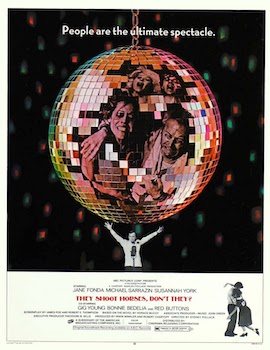
They Shoot Horses, Don't They? is a 1969 American psychological drama film directed by Sydney Pollack, from a screenplay written by Robert E. Thompson and James Poe, based on Horace McCoy's 1935 novel of the same name, and starring Jane Fonda, Michael Sarrazin, Susannah York, Gig Young, Bonnie Bedelia and Red Buttons. It focuses on a disparate group of individuals desperate to win a Depression-era dance marathon and an opportunistic emcee who urges them on.

Ingrid Lilian Thulin was a Swedish actress and director who collaborated with filmmaker Ingmar Bergman. She was often cast as harrowing and desperate characters, and earned acclaim from both Swedish and international critics. She won the Cannes Film Festival Award for Best Actress for her performance in Brink of Life (1958) and the inaugural Guldbagge Award for Best Actress in a Leading Role for The Silence (1963), and was nominated for a Best Supporting Actress BAFTA for Cries and Whispers (1972).
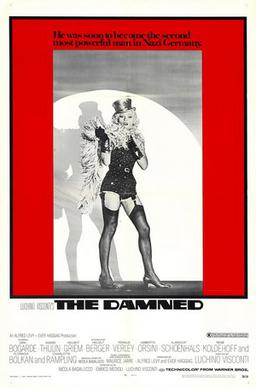
The Damned is a 1969 historical drama film directed by Luchino Visconti, co-written by Visconti with Nicola Badalucco and Enrico Medioli, and starring Helmut Berger, Dirk Bogarde, Ingrid Thulin, Helmut Griem, Umberto Orsini, Charlotte Rampling, Florinda Bolkan, and Albrecht Schönhals in his final film. Set in 1930s Germany, the film centers on the Essenbecks, a wealthy industrialist family who have begun doing business with the Nazi Party, and whose amoral and unstable heir, Martin, is embroiled in his family's machinations. It is loosely based on the Krupp family of steel industrialists from Essen, Germany.
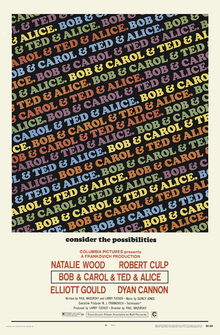
Bob & Carol & Ted & Alice is a 1969 American comedy-drama film directed by Paul Mazursky, written by Mazursky and Larry Tucker, who also produced the film, and starring Natalie Wood, Robert Culp, Elliott Gould, and Dyan Cannon. The original music score was composed by Quincy Jones. The cinematography for the film was by Charles Lang. The film received four Academy Award nominations, including ones for Gould and Cannon. Patricia Welles wrote the paperback novel from Mazursky and Tucker's screenplay.
Damned or The Damned may refer to:

Sylvia Miles was an American actress. She was twice nominated for the Academy Award for Best Supporting Actress for her performances in Midnight Cowboy (1969) and Farewell, My Lovely (1975).

Death in Venice is a 1971 historical drama film directed and produced by Italian filmmaker Luchino Visconti, adapted by Visconti and Nicola Badalucco from the 1912 novella of the same name by German author Thomas Mann. It stars Dirk Bogarde as Gustav von Aschenbach and Björn Andrésen as Tadzio, with supporting roles played by Mark Burns, Marisa Berenson and Silvana Mangano. It was filmed in Technicolor by Pasqualino De Santis, with a soundtrack featuring classical composers such as Gustav Mahler, Ludwig van Beethoven and Modest Mussorgsky. It is the second part of Visconti's thematic "German Trilogy"—preceded by The Damned (1969) and followed by Ludwig (1973).
The 4th Los Angeles Film Critics Association Awards, honoring the best in film for 1978, were announced on 16 December 1978.
The 44th New York Film Critics Circle Awards honored the best filmmaking of 1978. The winners were announced on 20 December 1978 and the awards were given on 28 January 1979.
The Nastro d'Argento for Best Director is a film award bestowed annually as part of the Nastro d'Argento awards since 1946, organized by the Italian National Association of Film Journalists, the national association of Italian film critics.
The BAFTA Award for Best Screenplay is a British Academy Film Award for the best script. It was awarded from 1968 to 1982. In 1983 it was split into BAFTA Award for Best Original Screenplay and BAFTA Award for Best Adapted Screenplay.

Jerome Hellman was an American film producer. He is best known for being the 42nd recipient of the Academy Award for Best Picture for Midnight Cowboy (1969). His 1978 film Coming Home was nominated for the same award.
Pasquale "Pasqualino" De Santis was an Italian cinematographer.
The 4th National Society of Film Critics Awards, given on 5 January 1970, honored the best filmmaking of 1969.
References
- ↑ Weiler, A. H. (30 December 1969). "'Z' Voted Best Film of 1969 by Critics Here; Jane Fonda and Jon Voight Capture Acting Honor". The New York Times. Retrieved 29 December 2017.